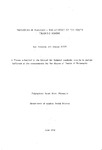IDEOLOGIES IN PRACTICE : THE CONTEXT OF THE YOUTH TRAINING SCHEME
| dc.contributor.author | Parsons, Ken | |
| dc.contributor.other | Faculty of Arts, Humanities and Business | en_US |
| dc.date.accessioned | 2013-09-11T10:42:09Z | |
| dc.date.available | 2013-09-11T10:42:09Z | |
| dc.date.issued | 1990 | |
| dc.identifier | NOT AVAILABLE | en_US |
| dc.identifier.uri | http://hdl.handle.net/10026.1/1654 | |
| dc.description.abstract |
The central concern in the thesis is the relationship between the 'concept of ideology' and the philosophies, motivations and lived experience of Youth Training Scheme (YTS) trainees and trainers. This incorporates both the application, effects and impact of official ideologies, expressed in youth policy initiatives and ideologies of the wider society. This in turn is related to the cultural and societal reproduction of young people as gendered and class specific workers in a segmented labour market. The empirical data were collected over a 20 month period at two off-the-job training establishments in the city of Surfton in the South West region of Britain and consisted of questionnaires participant observations and interviews. The first part of the thesis critically reviews the social science literature relating to the new vocationalism, the YTS, labour market segmentation and the concept of ideology. This establishes a series of theoretical concerns which are then tested against empirical data. The thesis demonstrates how formalised official ideologies are mediated through the YTS curriculum and affect the philosophies of both the trainers who implement this curriculum and the trainees who receive this curriculum. The thesis illustrates that YTS participants may support, reinterpret or subvert the official philosophies of the YTS by actually bringing meaning into their lived experiences via ideologies associated with their historical, positional, family class and gendered backgrounds. The thesis will show that the trainees learn not so much technical knowledge, but how to acquire the ideological and practical cultural meanings of a series of workers for a segmented labour market, with greater or lesser collusion from their trainers. The thesis contributes to existing knowledge both at the level of data generation and by illustrating a series of complex, refined and subtle ideological mechanisms which contribute further to our understanding of the microsociology of inequality. | en_US |
| dc.language.iso | en | en_US |
| dc.publisher | University of Plymouth | en_US |
| dc.title | IDEOLOGIES IN PRACTICE : THE CONTEXT OF THE YOUTH TRAINING SCHEME | en_US |
| dc.type | Thesis | |
| plymouth.version | Full version | en_US |
| dc.identifier.doi | http://dx.doi.org/10.24382/3265 | |
| dc.identifier.doi | http://dx.doi.org/10.24382/3265 |
Files in this item
This item appears in the following Collection(s)
-
01 Research Theses Main Collection
Research Theses Main


